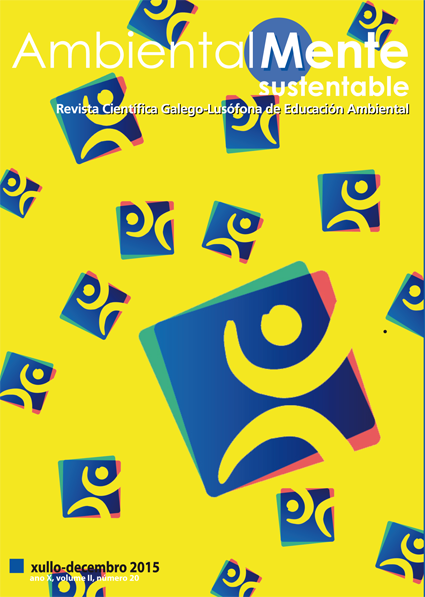Como abordan o Cambio Climático os libros de texto da Ensinanza Secundaria Obligatoria na España
DOI:
https://doi.org/10.17979/ams.2015.02.020.1603Palabras clave:
cambio climático, libros de texto, Educación Secundaria, educación ambiental, representacións sociaisResumo
Resulta imprescindible coñecer como se constrúe socialmente a realidade arredor do cambio climático para comprender as respostas das persoas e das institucións ante esta ameaza. Os informes do IPCC son o referente científico sobre o cambio climático, nos que se aúnan perspectivas técnicas, sociais, económicas e ambientais, máis que de feito non chegan de forma efectiva á cidadanía. Tendo en conta que o coñecemento cotidiano se constrúe fundamentalmente a través dos medios de comunicación, as redes sociais e, tamén, polo sistema educativo, consideramos interesante analizar a información que están a ofrecer os libros de texto sobre o cambio climático, para axudar a comprender as ideas que manexa o alumnado e o profesorado, xa que se trata do recurso didáctico máis utilizado nas aulas escolares no Estado español. Os libros de texto reproducen, transmiten e lexitiman o coñecemento elexido e imposto por unha élite a través dos currículos oficias, dandolles a apariencia de obxectivo e científico. Unha análise en profundidade pode desvelar os puntos febles que deben asumir como retos os programas de Educación Ambiental. Adiantamos algunhas achéguedas do estudo piloto no que analizamos textos de Educación Secundaria utilizados nos centros galegos. Este estudo enmárcase no Proxecto RESCLIMA, que estuda a relación entre ciencia e cultura común nas representacións sociais do cambio climático.
##plugins.themes.default.displayStats.downloads##
Citas
ACSELRAD, Henri (2004). Justiça ambiental-ação coletiva e estratégias argumentativas. En Henri ACSELRAD, Selene HERCULANO e José Augusto PÁDUA (orgs), Justiça Ambiental e Cidadania. Pp. 23-39. Rio de Janeiro: Relume Dumará/Fundação Ford.
ACSELRAD, Henri; Selene HERCULANO e José Augusto PÁDUA (orgs), Justiça Ambiental e Cidadania. Rio de Janeiro: Relume Dumará/Fundação Ford.
APPLE, Michael (1989). Maestros y textos. Barcelona: Paidós.
APPLE, Michael (1993). El libro de texto y la política cultural. Revista de Educación, nº 341, pp. 109-126.
ATHANASIOU, Tom e Paul BAUER (2002). Dead heat: Global justice and climate change. Nova Iork: Seven Stories Press.
Bardin, Laurence (1996) Análisis de contenido. Madrid: Akal.
BAYONA AZNAR, Bernardo (2009). Reflexiones y propuestas sobre políticas de gratuidad de los libros de texto. Madrid: ANELE.
BOADA, Martí e David SAURI (2003). El cambio global. Barcelona: Rubes.
Bullard, Robert D. (2002). Confronting Environmental Racism in the Twenty-First Century. Global Dialogue, v. 4, nº 11, winter. [http://www.worlddialogue.org/content.php?id=179].
Cembranos, Fernando; Yayo Herrero e Marta PascuaL (2007). Educación y Ecología. El curriculum oculto antiecológico de los libros de texto. Barcelona: Ed. Popular.
DOYLE, Julie (2007). Picturing the clima(c) tic: Greenpeace and the representational politics of climate change communication, Science as Culture, nº 16, pp. 129-150.
GONZÁLEZ GAUDIANO, Edgar (2012). La representación social del Cambio Climático. Una revisión internacional. Revista Mexicana de Investigación Educativa, vol. 17. nº 55, pp. 1035-1062.
HERRERO, Yayo; Fernando CEMBRANOS e Marta PASCUAL (Coord.) (2015). Cambiar las gafas para mirar el mundo. Una nueva cultura de la sostenibilidad. Madrid: Libros en Acción.
HULME, Mike e John TURNPENNY (2004). Understanding and managing climate change: the UK experience, The Geographical Journal, 170 (2), 105-115.
IDAE (2004). Europeans’ attitudes towards climate change. Report. European Commission.
IPCC (2014a). Climate Change 2014: Synthesis Report. UK: Cambridge University Press
IPCC (2014b). Sustainable development and equity. In: Climate Change 2014: Mitigation of Climate Change. Contribution of Working Group III to the Fifth Assessment Report of the Intergovernmental Panel on Climate Change. UK: Cambridge University Press.
MEIRA CARTEA, Pablo A. (2009). Comunicar el cambio climático. Escenario social y líneas de actuación. Madrid: Ministerio de Medio Ambiente y Medio Rural y Marino e Organismo Autónomo de Parques Nacionales.
MEIRA CARTEA, Pablo A. (2012). Ideas de la gente sobre cambio climático: una relectura. En Calisto FLORES (coord.), En la búsqueda de los sentidos y significados de la educación ambiental, pp. 73-91. México: UPN.
MEIRA CARTEA, Pablo A. (coord.) (2013). La respuesta de la sociedad española ante el cambio climático. 2013. A Coruña: Mapfre.
Michaels, David e Celeste Montforton (2005). Manufacturing Uncertainty: Contested Science and the Protection of the Public’s Health and Environment, American Journal of Public Health, nº 95, pp. S39-S48.
MOSER, Susanne C. (2010). Communicating climate change: history, challenges, process and future directions, Climate Change, nº 1, pp. 31-53.
NACIÓNS UNIDAS (2015). Acuerdo de París [http://unfccc.int/meetings/paris_nov_2015/items/9445.php].
PAPA FRANCISCO (2015). Laudato sí’. Madrid: Libreria Editrice Vaticana.
PEW RESEARCH CENTER (2015). Public and Scientists ‘Views on Science and Society’” [www.pewinternet.org/2015/01/29/public-and-scientists-views-on-science-and-society/]
PNUD (2007). Informe sobre Desarrollo Humano 2007-2008. La lucha contra el cambio climático: solidaridad frente a un mundo dividido. Barcelona: Mundi-Prensa..
PUNTER CHIVA, M. Pilar (2014). Culturas visuais do cambio climático na prensa española: o caso do ABC. ambientalMENTE sustentable, nº 18 (II), pp. 7-21.
Ravetz, Jerome e Silvio Funtowicz (2000). La ciencia posnormal. Ciencia con la gente. Madrid: Icaria.
Sato, Michéle (2013). Justiça climática e céticos. [https://onedrive.live.com/view.aspx?resid=6F738C9CF42A30B0!5532&app=PowerPoint&authkey=!AGIHjv83cmyALS0].
SERANTES, Araceli (2014). El cambio climático en los libros de texto o cómo el sistema educativo contribuye a la construcción del saber sobre cambio climático. RESCLIMA. [http://www.resclima.info/node/129].
Sonnett, John H. (2006). Representing the Earth: Global Climate Issues in Popular, Political, Scientific, Business, Industry, and Environmentalist News. A New Old Sociology of Knowledge. Dissertation. The University of Arizona. [http://hdl.handle.net/10150/194806]
VAN DIJK, Teun A. (2003). Ideología y discurso. Una introducción interdisciplinar. Barcelona: Ariel.
Descargas
Publicada
Número
Sección
Licenza
Os traballos publicados nesta revista están baixo unha licenza Creative Commons Recoñecemento-CompartirIgual 4.0 Internacional.
Permitese e anímase aos autores a difundir os artigos aceptados para a súa publicación nos sitios web persoais ou institucionais, antes e despois da súa publicación, sempre que se indique claramente que o traballo pertence a esta revista e se proporcionen os datos bibliográficos completos xunto co acceso ao documento.



